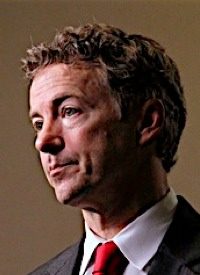
If Rand Paul’s poll numbers are confirmed in today’s Republican primary in Kentucky, it will, according to the New York Times, “mark one of the most important moments yet for the Tea Party.” Establishment Republicans such as Mitch McConnell (R-Ky.) and former Vice President Dick Cheney have endorsed Paul’s opponent, Trey Grayson. But it is Paul who is leading by double-digits in the latest polls, and the polls also show Rand leading his potential Democrat challengers, state Attorney General Jack Conway and Lt. Gov. Daniel Mongiardo. That is, it appears likely that Rand Paul will not only win today’s primary but will go on to win the Senate seat now held by retiring Senator Jim Bunning in November.
Paul, who has never held elected office, announced his candidacy in August last year, and was an immediate 20-point underdog to Grayson. Three things worked in his favor to reverse that so that by December Paul was leading Grayson, never to fall behind again. First of all, incumbents were weighed down heavily as responsible for the huge deficits proposed and passed by the Obama administration. Although not an incumbent, Grayson’s affiliation with respectable establishment politicians painted him with the same anti-incumbent brush. Secondly, Paul’s fund-raising efforts pioneered during his father’s run for President in 2008, called “money bombs,” were effective in raising “early” money for his campaign. Thirdly, and most important, was his message to Tea Partiers.
According to CNN, “Paul, like his father, is a strict constitutionalist who believes in traditional Republican principles like small government and a free-market approach to the economy.” As founder and chairman of Kentucky Taxpayers United, he says that the government needs to stop borrowing money because “we cannot borrow our way into prosperity.” He stressed his status as an outsider, saying, “You need people outside of government. If your primary goal is to continue your career, you tend to do things that are good for you, but not necessarily good for the country.” Paul adds, “People … want to like you, they want to trust you. But it’s up to the politician who’s running to stand for something, and that’s what energizes your base, your supporters, and [helps you to raise] your money.”
Across Kentucky Paul has made efforts to make clear that he “stands for something”: He wants to abolish the Federal Reserve and the Department of Education. He supported Senator Bunning’s vote against the bank bailout. In reviewing his positions, the New York Times pointed out that, with “53 percent of Tea Partiers classify[ing] themselves as ‘angry’ at the way things are going in Washington — the federal government doesn’t need a mechanic, it needs a demolition man.”
Paul is endorsed by Downsize DC Foundation, Concerned Women for America, Gun Owners of America, Steve Forbes, FreedomWorks, Sarah Palin, and Jim Bunning. Paul opposes the Patriot Act, and has suggested that American military presence in the Middle East might have had something to do with the 9/11 attacks. He also opposes closing Guantanamo Bay and says he would “try the terrorists captured on the battlefield in military tribunals at GITMO” rather than in civilian courts.
Salon.com says that Paul’s political genius “is his ability to cultivate a narrative that speaks to all strains of the Tea Party movement at once.” When interviewed by Neil Cavuto last week, Paul said the reason his campaign appears headed for success is that “it’s about the issues. It’s about the bank bailout. We, as Republicans, don’t believe in bailing out failed businesses, much less about having the government [owning them]…. We’re about doing something about the debt, getting rid of pork barrel spending … the issues that the Tea Party represents, things like term limits, a balanced budget amendment, read the bills, point out where the bills [have] constitutional authority … things like this are popular across party lines.”
The Times concludes that Paul “rejects the suggestion that voters would find any of his views outside the mainstream.” (Emphasis added.) But at a rally on Saturday, Paul told his supporters that he would not “shove them aside and get rid of the Tea Party” if he wins the primary. Paul admitted, however, that “even my advisors sometimes will say, ‘Oh, you have to drop this Tea Party thing a little bit.’” Paul says that if he joins the Republicans in the Senate, he would not intentionally be “a fly in the ointment.”
If Paul wins today’s primary, he still has his work cut out for him to take Bunning’s seat next year. If he succeeds, Paul’s supporters will need to remember that getting a good man elected is only half of the job in restoring freedom and the Constitution. The other half is keeping him true to his promises. They must not forget Thomas Jefferson’s dictum: “In questions of power, then, let no more be heard of confidence in man, but bind him down from mischief by the chains of the Constitution.”
Photo of Rand Paul: AP Images
Related article:



